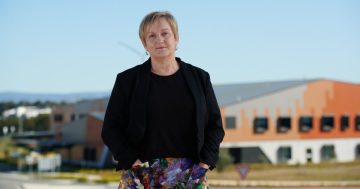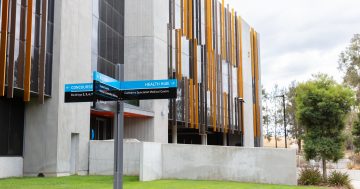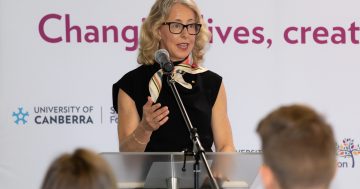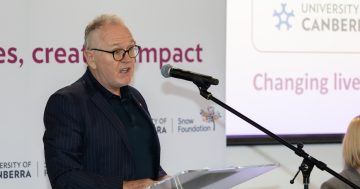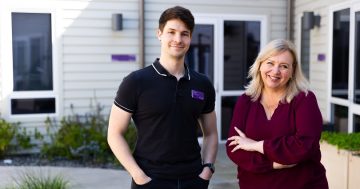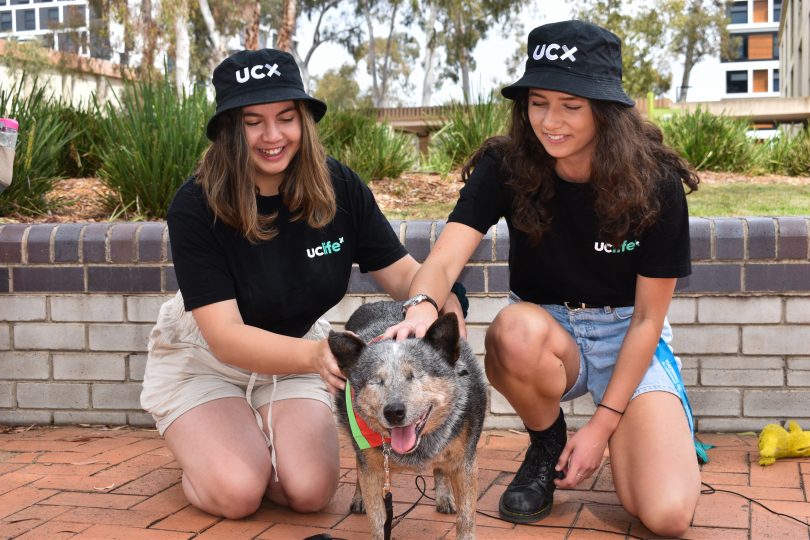
Alicia Hargraves (left) and Holly Williams (right) hang out with Holly from the Delta Dogs. Photos: Madeleine Wood.
As exam season descends upon the University of Canberra (UC), an initiative has been rolled out across campus last week to tackle the high-levels of stress and mental health problems that university students can experience.
Stress Less Week happens each semester the week before exams start to allow students to relax, de-stress, calm down and have little breaks before the chaos starts.
Programs included a procrastination station, pancake breakfasts and free food, video games, yoga and the therapeutic Delta Dogs that came to visit.
In addition to a variety of activities scattered around campus, Campus Life Intern and one of the student organisers of the initiative, Holly Williams, says a main focus of Stress Less Week is to direct students to medical and counselling services to make sure that they aren’t overwhelmed.
“We’re doing a lot of work with counselling, welfare and sport,” she says. “It’s always good to talk to people, it’s just good to communicate because some people do stay in the library for 12 hours.”
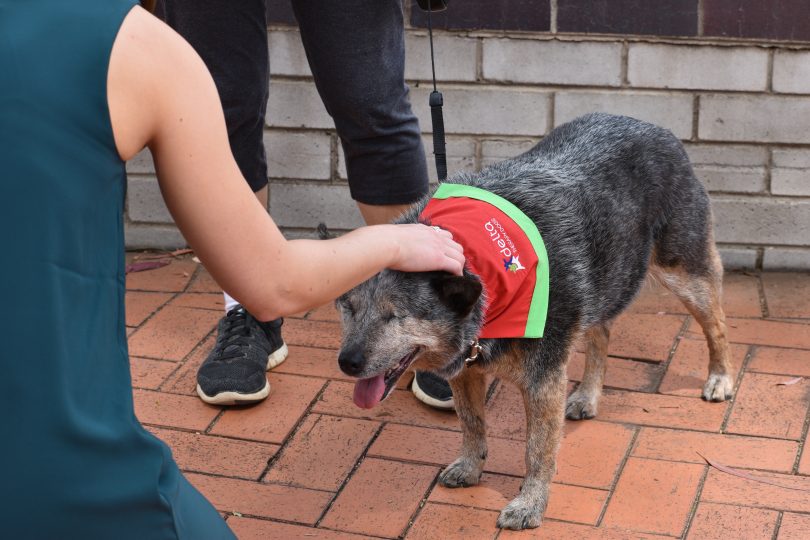
Therapy dogs are just one part of the Stress Less initiative to help students relax before exams.
Clinical Psychologist and Assistant Professor in Psychology at the University of Canberra, Dr Vivienne Lewis, says weeks like this are very important to student wellbeing as stress can often cause more problematic psychological and emotional symptoms as well.
“Stress interferes with sleep and eating and people become more withdrawn from social activities. People can get muscle tension and tend to not enjoy activities as much as they would,” she says.
“They can also be angered and frustrated more easily, which puts strains on relationships.”
While Professor Lewis says there hasn’t necessarily been an increase in stress across universities, better identification of mental health problems are proving to be beneficial in tackling the issue.
“It’s more that people have more awareness of the importance of lowering stress levels and mental health and wellbeing, which is good because it increases the awareness of what students need to do to keep stress levels down,” she says.
“For students to do well they need to keep stress down to a manageable level to do their best work, because when people are stressed concentration and work quality often suffer.”
The focus on mental health during Stress Less week is all part of a broader UC approach to student welfare and mental health, including a new grant to support mental health research projects.
The $100,000 Betty Kitchener Prize, named after an esteemed UC graduate and co-founder of the Mental Health First Aid Program, which boasts alumni like Michelle Obama, aims to revolutionise the way in which mental health problems are identified and treated.
Ms Kitchener and her husband, Professor Tony Jorm, donated the endowed fund to UC to support the important research being done in the mental health space.
“When we were students, both Betty and I benefited from awards that were funded by philanthropic donations,” says Professor Jorm.
“In funding this award, I hope to do the same for future generations of students and early career researchers, specifically those working in the important area of mental health.”
Executive Dean of Health UC Professor Michelle Lincoln says high-quality research is needed to determine how to best support people and intervene in mental health crises. She also says that promoting mental health and identifying effective recovery practices is also vital to tackling the issue.
“It’s estimated that every year in Australia, 20 per cent of people aged 16-85 years will experience a form of mental illness,” Professor Lincoln says.
“The nature of the endowment will see annual contributions being made to mental health research projects for many years to come. Such generosity will ensure we continue to design, evaluate and improve mental health supports and services.”
Crisis support and suicide prevention are available through Lifeline Australia on 13 11 14 or on their website https://www.lifeline.org.au












